中考二轮专题 状语从句复习课件
图片预览
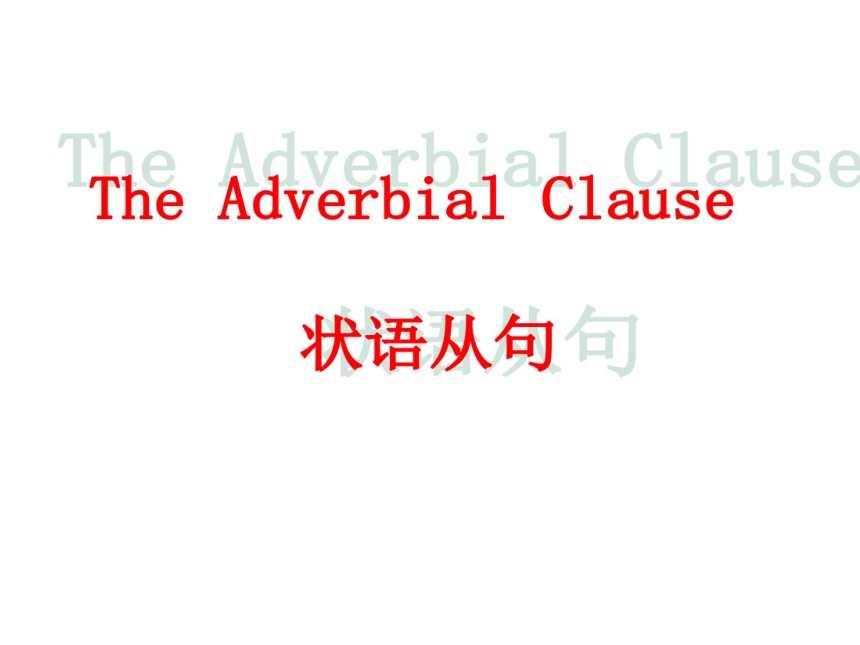
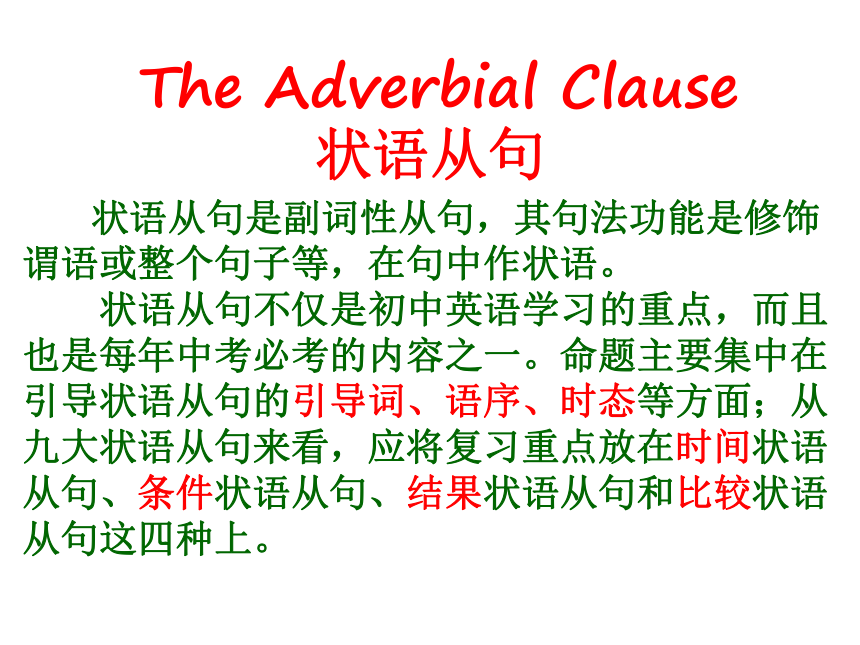
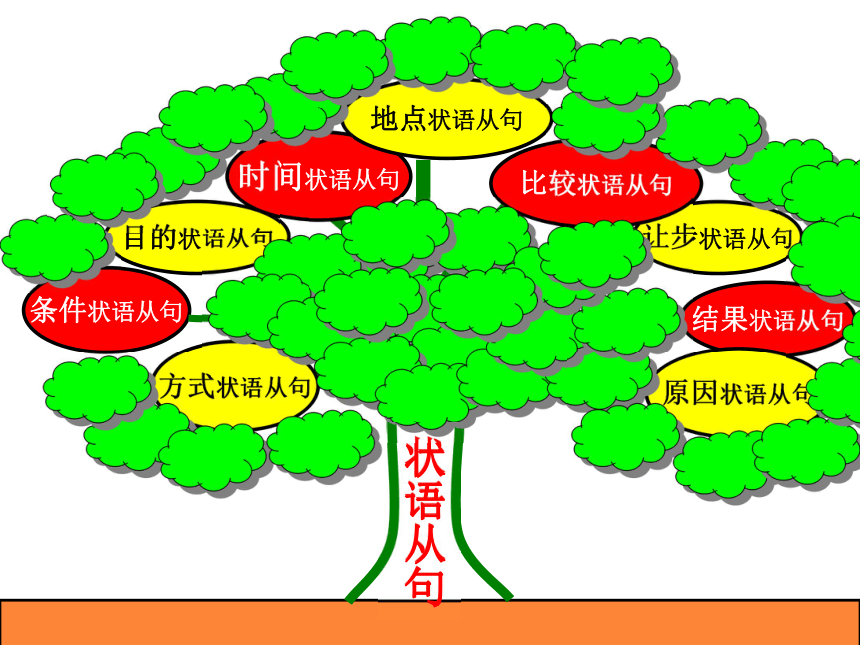
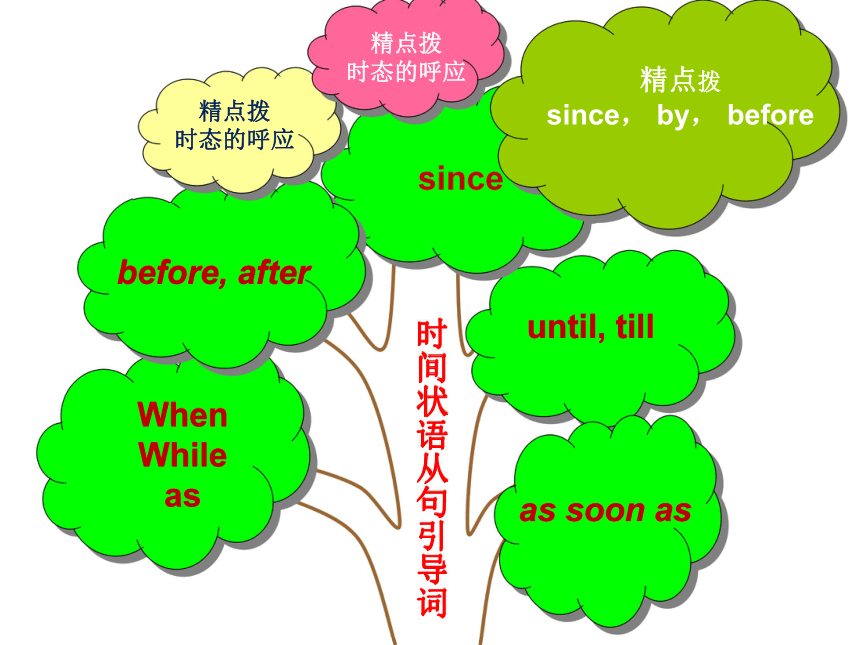

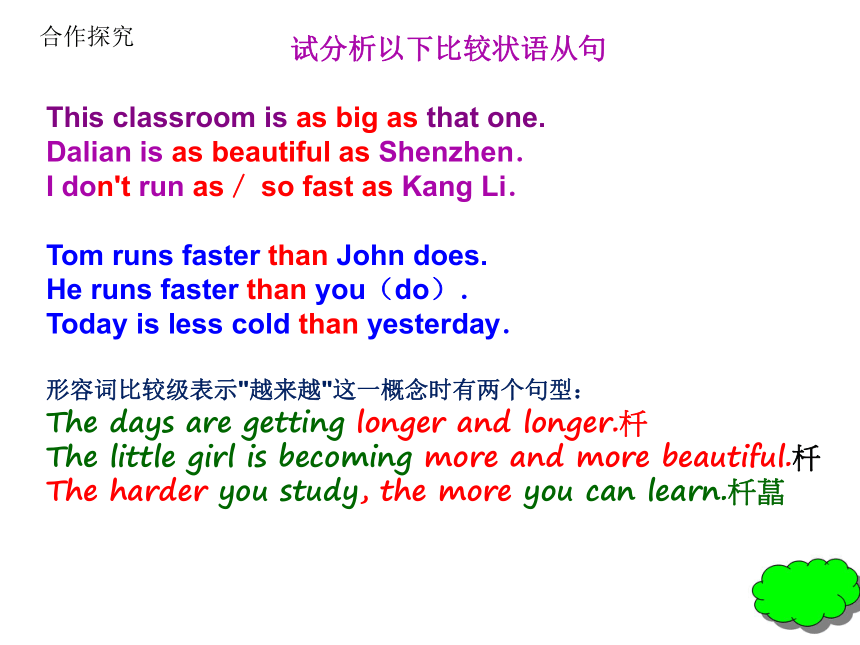
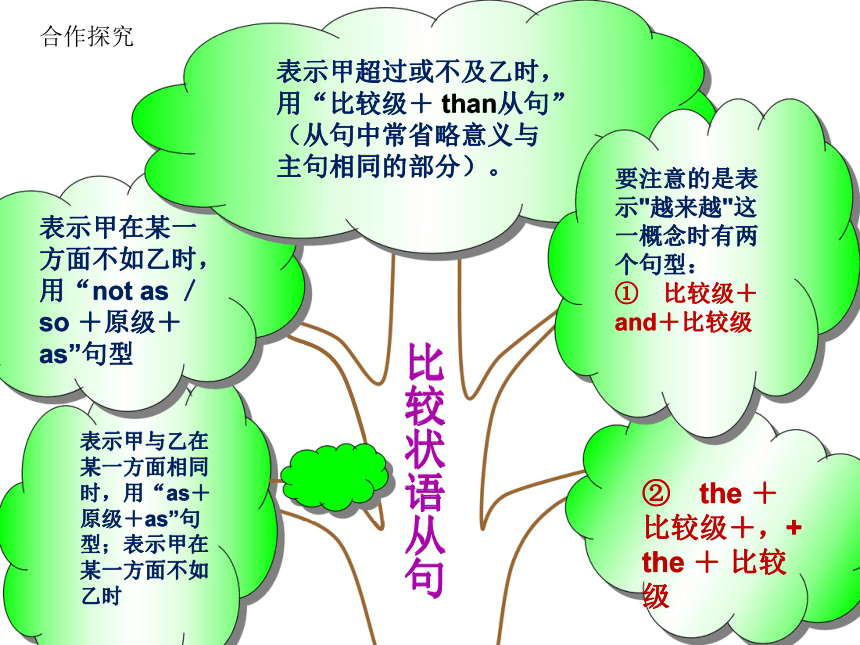
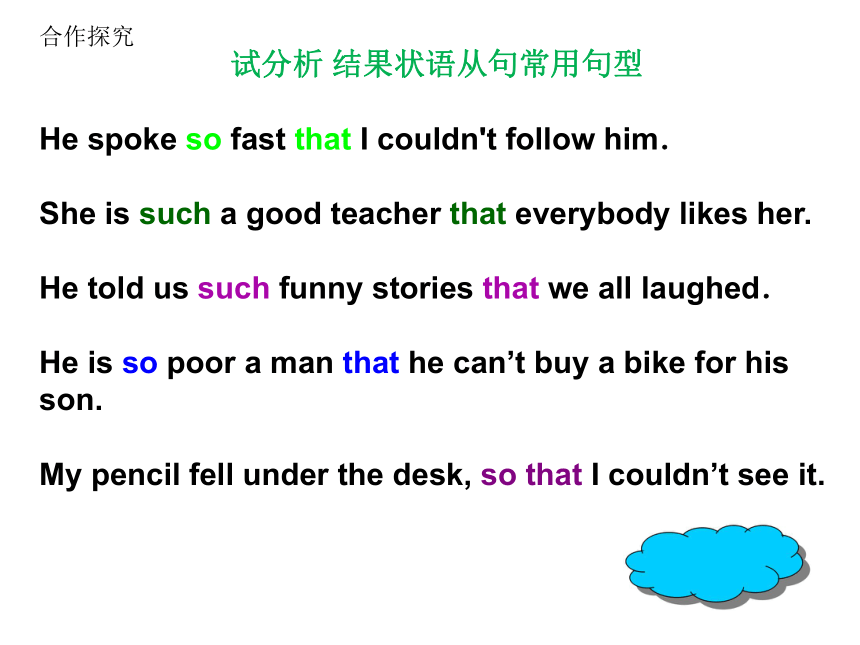
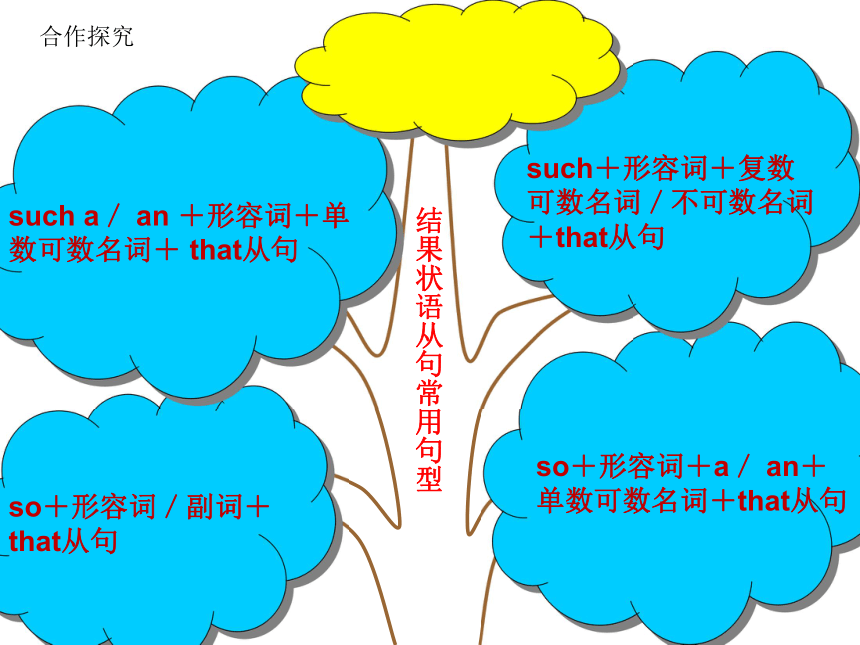
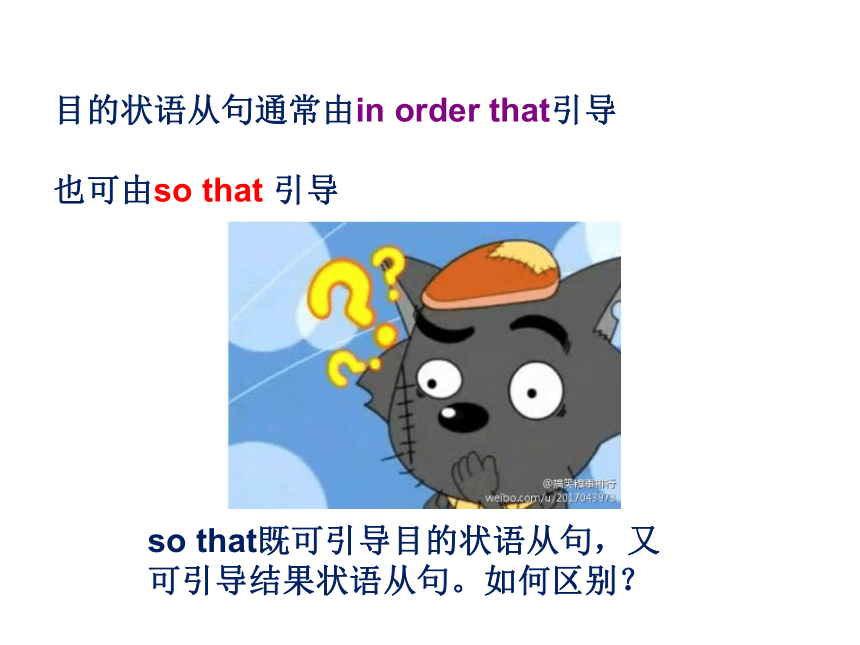
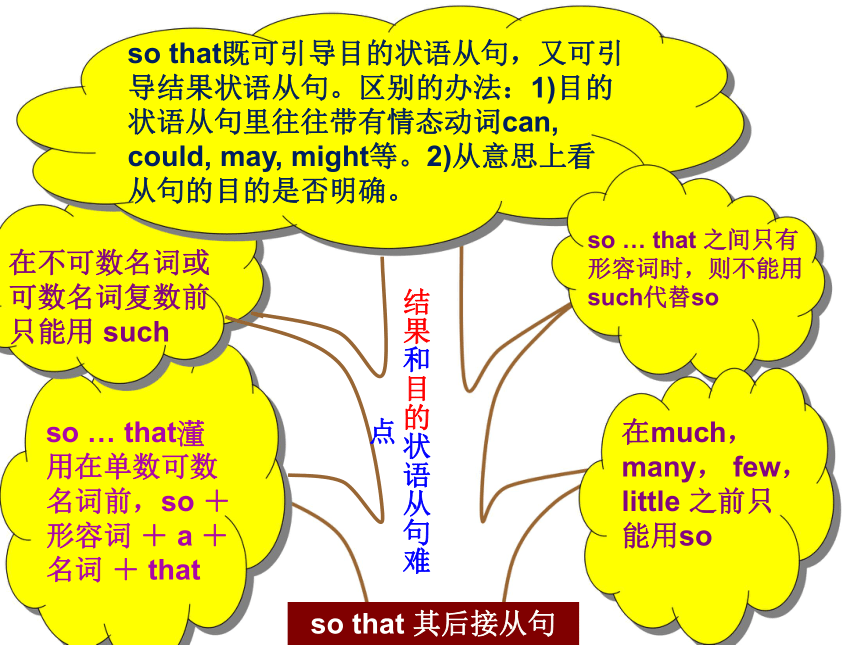
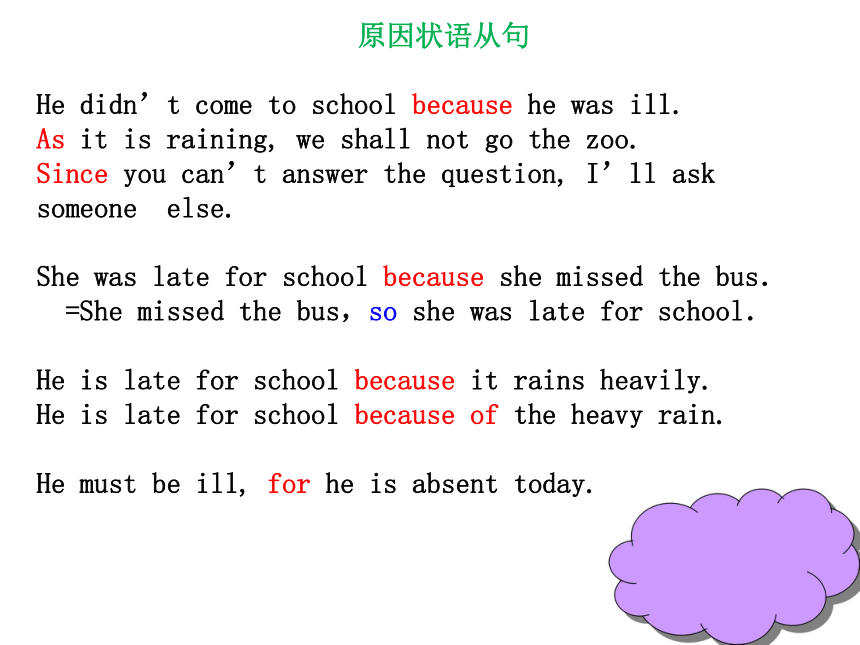
文档简介
课件36张PPT。The Adverbial Clause
状语从句 The Adverbial Clause
状语从句
状语从句是副词性从句,其句法功能是修饰谓语或整个句子等,在句中作状语。
状语从句不仅是初中英语学习的重点,而且也是每年中考必考的内容之一。命题主要集中在引导状语从句的引导词、语序、时态等方面;从九大状语从句来看,应将复习重点放在时间状语从句、条件状语从句、结果状语从句和比较状语从句这四种上。
方式状语从句条件状语从句目的状语从句让步状语从句时间状语从句结果状语从句比较状语从句状语从句原因状语从句地点状语从句时间状语从句引导词When
While
asbefore, afteruntil, tillas soon assince精点拨
时态的呼应精点拨
时态的呼应精点拨
since, by, before条件状语从句引导条件状语从句的连词有if(如果)、unless(除非)等,条件状语从句也像时间状语从句一样,如果主句用将来时,从句要用现在时代替将来时。unless在意义上相当于if...not。“祈使句 + and (or)+ 陈述句” 在意思上相当于一个带有条件状语从句的复合句。其中,and表示句意顺承;or表示转折,意为“否则”。用介词with, without可以把条件状语从句改写成简单句合作探究试分析以下比较状语从句
This classroom is as big as that one.
Dalian is as beautiful as Shenzhen.
I don't run as/ so fast as Kang Li.
Tom runs faster than John does.
He runs faster than you(do).
Today is less cold than yesterday.
形容词比较级表示"越来越"这一概念时有两个句型:
The days are getting longer and longer.?
The little girl is becoming more and more beautiful.?
The harder you study, the more you can learn.??
合作探究比较状语从句表示甲与乙在某一方面相同时,用“as+原级+as”句型;表示甲在某一方面不如乙时表示甲在某一方面不如乙时,用“not as /so +原级+as”句型表示甲超过或不及乙时,用“比较级+ than从句”(从句中常省略意义与主句相同的部分)。要注意的是表示"越来越"这一概念时有两个句型:
① 比较级+and+比较级② the + 比较级+,+ the + 比较级合作探究 试分析 结果状语从句常用句型
He spoke so fast that I couldn't follow him.
She is such a good teacher that everybody likes her.
He told us such funny stories that we all laughed.
He is so poor a man that he can’t buy a bike for his son.
My pencil fell under the desk, so that I couldn’t see it.
合作探究结果状语从句常用句型so+形容词/副词+
that从句 such a/ an +形容词+单数可数名词+ that从句 such+形容词+复数可数名词/不可数名词+that从句so+形容词+a/ an+单数可数名词+that从句 合作探究目的状语从句通常由in order that引导
也可由so that 引导
so that既可引导目的状语从句,又可引导结果状语从句。如何区别?在不可数名词或可数名词复数前只能用 suchso … that 之间只有形容词时,则不能用 such代替so在much, many, few, little 之前只能用soso … that?用在单数可数名词前,so + 形容词 + a + 名词 + thatso that既可引导目的状语从句,又可引导结果状语从句。区别的办法:1)目的状语从句里往往带有情态动词can, could, may, might等。2)从意思上看从句的目的是否明确。so that 其后接从句结果和目的状语从句难点原因状语从句
He didn’t come to school because he was ill.
As it is raining, we shall not go the zoo.
Since you can’t answer the question, I’ll ask
someone else.
She was late for school because she missed the bus.
=She missed the bus,so she was late for school.
He is late for school because it rains heavily.
He is late for school because of the heavy rain.
He must be ill, for he is absent today.
原因状语从句because和becouse of 也有明显的区别。because后面要跟从句,而because of 后面要跟名词短语for是并列连词,引导的句子不置于句首,是一种非直接的、随便附加说明的理由或推断。because和so不能同用在一个句子里。原因状语从句通常由because, since, as引导。because从句一般位于主句后;since、as从句一般放在主句前。合作探究 试分析让步状语从句
Though he is young, he knows a lot.
Although I am tired, I must go on working.
Even if he is poor, she loves her husband.
我们不能说:Though it was raining hard, but he still went out.
应该说:Though it was raining hard, he still went out.或It was raining hard, but he still went out.
合作探究让步状语从句though
(虽然)although
(虽然)even though
(尽管)even if(即使)whoever(无论谁)Whatever
(无论什么)because不能与并列连词so同时在句中使用though /although不能与but同时在句中使用方式状语从句引导词常用as(按照)as (连词)与 like (介词)的区别。 as 作为连词其后接从句,而 like 是介词,其后要接的是词组地点状语从句常常由where来引导方式状语从句地点状语从句选择完型1) when表示主句的动作和从句的动作同时或先后发生。它既可以指时间段也可指时间点, 从句中既可用延续性动词又可用非延续性动词。2)当从句的动作发生于主句动作之前,只能用when 引导这个从句,不可用as 或 while。3)as, when 引导短暂性动作的动词表示“当……时”可以互换。 4)as引导时间状语从句与when相似,但侧重强调主从句动作同时间点或同时间段进行。精确
点拨
When
While
As
区分
●I feel very happy when you come to see me. 你(们)来看我,我感到很高兴。
●When you are crossing the street,you must be careful. 你(们)过街道时,一定要小心。●When you have finished your work, you may have a rest. 你完成作业了才可以休息。●He smiled as / when he passed. 他路过的时候笑了一下。 (两个都是短暂动作)●Helen heard the story as she washed. 海伦一边洗衣服一边听故事。
●He saw that she was smiling as she read.他看到她一边看着书一边笑。(两个都是延续性动作)2) before, after
They had already had breakfast before they went to school
They talked about the party after the people left.before表示主句发生的动作发生在从句动作之前,意为“在……之 前”。 after表示主句发生的动作发生在从句动作之后,意为 “在…… 之后”。since:
如:
He has studied very hard since he?came?to our school. 表示 “自从…以来”,从句中常用过去时,主句用一般现在时或现在完成时.(对since 引导的时间状语提问要用how long).由since, by, before 来引导的时间状语从句。
since 引导的时间状语是动作的开始时间,
如: I have studied English since 1990.
而由 by 引导的时间状语通常是动作的结束时间,如: I had learned 25 English songs by the end of last term.
注意:before 则多用于完成时, ago 则多用于一般过去时,
如:He had finished his work before twelve yesterday?
I left my hometown two years ago? till / until 意为“直到……时”,引导时间状语从句时,表示主句的动作发生在从句的动作之前。
1)肯定形式表示的意思是“做某事直至某时”,动词必须是延续性的。意为“直到……为止”,强调主句动作的结束,用延续性动词.
●I’ll stay here until you come back. 我会呆在这里,直到你回来。(stay表示的动作可以持续)
2)否定形式表达的意思是“直至某时才做某事”。“ not … until …”引导的时间状语从句,意为“直到……才”,强调主句动作的开始。
●He didn’t go to bed until he finished his homework. 完作业才睡觉。
●Don’t get off the bus until it has stopped. 公共汽车停稳后再下车。
3) not until …放在句首,主句用倒装。
●Not until the early years of the 19th century did man know what heat is. 直到19 世纪初,人类才知道热能是什么。
●Not until I began to work did I realize how much time I had wasted. 直到我开始工作,我才认识到了我已浪费了多少时间。 as soon as
My brother went out as soon as I got home.
I'll phone you as soon as I arrive in Tonghua.表示主句发生的动作发生在从句动作之后, 意为“一…就…”。
如果主句是一般将来时,情态动词加动词原形或祈使句时,时间状语从句用一般现在时。 注意: 在时间状语从句中,主句和从句之间的时态应按下列规律确定。
1)主句一般将来时,从句用一般现在时(特别是用 as soon as 引导从句时):The boy will be a writer when he grows up. I’ll ring you up as soon as I get to New York.
2) 主句含有情态动词,从句用一般现在时:
When the lights are red, the traffic must stop.
3) 主句为祈使句时,从句用一般现在时:
Please don’t go to bed before you finish your homework.
4) 主句为一般过去时,从句也用过去时态:
I liked reading when I was young.时态的呼应在状语从句中用一般现在时或一般过去时表示将来。
它的1.0版本是主句用一般将来时,从句用一般现在时,如: If it rains, they won’t go to the park on Sunday?
2.0版本主句是一般过去时,从句用过去将来时,
如: He said if it rained the next day he would not go to the park?
考试中的难点是:要区别if从句是条件状语从句还是宾语从句,因在宾语从句中该用什么时态用什么时态,如: I want to know if he will come here tomorrow?
I want to know if it rains he will come here tomorrow??精确点拨What shall we do if it snows tomorrow?
Don’t leave the building unless I tell you to.
1)引导条件状语从句的连词有if(如果)、unless(除非)等,条件状语从句也像时间状语从句一样,如果主句用将来时,从句要用现在时代替将来时。
You will fail unless you study hard.=You will fail if you don't study hard.
2) unless在意义上相当于if...not。
3) “祈使句 + and (or)+ 陈述句” 在意思上相当于一个带有条件状语从句的复合句。其中,and表示承接,句意“然后”;or表示转折,意为“否则”。例如:
Hurry up, or you’ll be late.=If you don’t hurry up, you’ll be late.
Study hard and you will pass the exam.=If you study hard, you will pass the exam. 4)用介词with, without可以把条件状语从句改写成简单句:
If there is no water, the fish may die. = Fish may die without water.
If you help me, I’ll finish my task on time.
= With your help, I’ll finish my task on time.See you next time!Speak clearly so that they may understand you.
(目的状语从句)
(结果状语从句)
Jack is badly ill so that he has to rest. (目的状语从句)
(结果状语从句)
合作分析 1. A 2. C 3. D 4. C
5. D 6. B 7. B 8. A
9. B 10. C 11. D 12.C
13.B 14.B 15.B 16.B
17.D 18.D 19.C 20.A选择 1. A 2. B 3.B 4. D 5. D
6. D 7. B 8. A 9. C 10. D完型1. The director asked me _____ I was good at singing. 2. The girl didn’t say anything _____ she saw her mother. 3. _______ Mr. Head is sixty years old, he is still learning English.
4. Don’t worry! I’ll give her the message ________ she comes back.
5. ______ you like the book very much, you can keep it for another two weeks.whetheruntilAlthoughas soon asSinceuntil,whether,although,as soon assince,完成句子
1.We have lived in this city ________ I moved here in 1990.
________1990年我搬到这儿以来我们就住在这个城市。
2. Don’t worry. I’ll phone you ___ ______ ___ I get the news.
别着急,我________得到消息________给你打电话。
3. The drunk man didn’t leave the station ________ the police came yesterday.
昨天________警察到来这个醉汉________离开车站。
4. ________ the soldiers felt tired and hungry, they still went on practising shooting.
________这些士兵感到又累又饿,但他们仍继续练习射击。since as soon as until Though 5. Mr. Zhang has spent much time travelling ________ he loves it.
张先生花了许多时间去旅游________他喜欢旅游。
6. It rained so heavily ________ people had to stop working in the fields.
雨下得很大________人们不得不停止在田地里工作。
7. Have you decided what you want to be ________ you grow up?
你已决定下来长大________你想成为什么了吗?
8. Perhaps I’ll work for the program, ________ ________ I can’t be an astronaut.
或许我会在这个系统中工作,________我成为不了一名宇航员。because that when even if
状语从句 The Adverbial Clause
状语从句
状语从句是副词性从句,其句法功能是修饰谓语或整个句子等,在句中作状语。
状语从句不仅是初中英语学习的重点,而且也是每年中考必考的内容之一。命题主要集中在引导状语从句的引导词、语序、时态等方面;从九大状语从句来看,应将复习重点放在时间状语从句、条件状语从句、结果状语从句和比较状语从句这四种上。
方式状语从句条件状语从句目的状语从句让步状语从句时间状语从句结果状语从句比较状语从句状语从句原因状语从句地点状语从句时间状语从句引导词When
While
asbefore, afteruntil, tillas soon assince精点拨
时态的呼应精点拨
时态的呼应精点拨
since, by, before条件状语从句引导条件状语从句的连词有if(如果)、unless(除非)等,条件状语从句也像时间状语从句一样,如果主句用将来时,从句要用现在时代替将来时。unless在意义上相当于if...not。“祈使句 + and (or)+ 陈述句” 在意思上相当于一个带有条件状语从句的复合句。其中,and表示句意顺承;or表示转折,意为“否则”。用介词with, without可以把条件状语从句改写成简单句合作探究试分析以下比较状语从句
This classroom is as big as that one.
Dalian is as beautiful as Shenzhen.
I don't run as/ so fast as Kang Li.
Tom runs faster than John does.
He runs faster than you(do).
Today is less cold than yesterday.
形容词比较级表示"越来越"这一概念时有两个句型:
The days are getting longer and longer.?
The little girl is becoming more and more beautiful.?
The harder you study, the more you can learn.??
合作探究比较状语从句表示甲与乙在某一方面相同时,用“as+原级+as”句型;表示甲在某一方面不如乙时表示甲在某一方面不如乙时,用“not as /so +原级+as”句型表示甲超过或不及乙时,用“比较级+ than从句”(从句中常省略意义与主句相同的部分)。要注意的是表示"越来越"这一概念时有两个句型:
① 比较级+and+比较级② the + 比较级+,+ the + 比较级合作探究 试分析 结果状语从句常用句型
He spoke so fast that I couldn't follow him.
She is such a good teacher that everybody likes her.
He told us such funny stories that we all laughed.
He is so poor a man that he can’t buy a bike for his son.
My pencil fell under the desk, so that I couldn’t see it.
合作探究结果状语从句常用句型so+形容词/副词+
that从句 such a/ an +形容词+单数可数名词+ that从句 such+形容词+复数可数名词/不可数名词+that从句so+形容词+a/ an+单数可数名词+that从句 合作探究目的状语从句通常由in order that引导
也可由so that 引导
so that既可引导目的状语从句,又可引导结果状语从句。如何区别?在不可数名词或可数名词复数前只能用 suchso … that 之间只有形容词时,则不能用 such代替so在much, many, few, little 之前只能用soso … that?用在单数可数名词前,so + 形容词 + a + 名词 + thatso that既可引导目的状语从句,又可引导结果状语从句。区别的办法:1)目的状语从句里往往带有情态动词can, could, may, might等。2)从意思上看从句的目的是否明确。so that 其后接从句结果和目的状语从句难点原因状语从句
He didn’t come to school because he was ill.
As it is raining, we shall not go the zoo.
Since you can’t answer the question, I’ll ask
someone else.
She was late for school because she missed the bus.
=She missed the bus,so she was late for school.
He is late for school because it rains heavily.
He is late for school because of the heavy rain.
He must be ill, for he is absent today.
原因状语从句because和becouse of 也有明显的区别。because后面要跟从句,而because of 后面要跟名词短语for是并列连词,引导的句子不置于句首,是一种非直接的、随便附加说明的理由或推断。because和so不能同用在一个句子里。原因状语从句通常由because, since, as引导。because从句一般位于主句后;since、as从句一般放在主句前。合作探究 试分析让步状语从句
Though he is young, he knows a lot.
Although I am tired, I must go on working.
Even if he is poor, she loves her husband.
我们不能说:Though it was raining hard, but he still went out.
应该说:Though it was raining hard, he still went out.或It was raining hard, but he still went out.
合作探究让步状语从句though
(虽然)although
(虽然)even though
(尽管)even if(即使)whoever(无论谁)Whatever
(无论什么)because不能与并列连词so同时在句中使用though /although不能与but同时在句中使用方式状语从句引导词常用as(按照)as (连词)与 like (介词)的区别。 as 作为连词其后接从句,而 like 是介词,其后要接的是词组地点状语从句常常由where来引导方式状语从句地点状语从句选择完型1) when表示主句的动作和从句的动作同时或先后发生。它既可以指时间段也可指时间点, 从句中既可用延续性动词又可用非延续性动词。2)当从句的动作发生于主句动作之前,只能用when 引导这个从句,不可用as 或 while。3)as, when 引导短暂性动作的动词表示“当……时”可以互换。 4)as引导时间状语从句与when相似,但侧重强调主从句动作同时间点或同时间段进行。精确
点拨
When
While
As
区分
●I feel very happy when you come to see me. 你(们)来看我,我感到很高兴。
●When you are crossing the street,you must be careful. 你(们)过街道时,一定要小心。●When you have finished your work, you may have a rest. 你完成作业了才可以休息。●He smiled as / when he passed. 他路过的时候笑了一下。 (两个都是短暂动作)●Helen heard the story as she washed. 海伦一边洗衣服一边听故事。
●He saw that she was smiling as she read.他看到她一边看着书一边笑。(两个都是延续性动作)2) before, after
They had already had breakfast before they went to school
They talked about the party after the people left.before表示主句发生的动作发生在从句动作之前,意为“在……之 前”。 after表示主句发生的动作发生在从句动作之后,意为 “在…… 之后”。since:
如:
He has studied very hard since he?came?to our school. 表示 “自从…以来”,从句中常用过去时,主句用一般现在时或现在完成时.(对since 引导的时间状语提问要用how long).由since, by, before 来引导的时间状语从句。
since 引导的时间状语是动作的开始时间,
如: I have studied English since 1990.
而由 by 引导的时间状语通常是动作的结束时间,如: I had learned 25 English songs by the end of last term.
注意:before 则多用于完成时, ago 则多用于一般过去时,
如:He had finished his work before twelve yesterday?
I left my hometown two years ago? till / until 意为“直到……时”,引导时间状语从句时,表示主句的动作发生在从句的动作之前。
1)肯定形式表示的意思是“做某事直至某时”,动词必须是延续性的。意为“直到……为止”,强调主句动作的结束,用延续性动词.
●I’ll stay here until you come back. 我会呆在这里,直到你回来。(stay表示的动作可以持续)
2)否定形式表达的意思是“直至某时才做某事”。“ not … until …”引导的时间状语从句,意为“直到……才”,强调主句动作的开始。
●He didn’t go to bed until he finished his homework. 完作业才睡觉。
●Don’t get off the bus until it has stopped. 公共汽车停稳后再下车。
3) not until …放在句首,主句用倒装。
●Not until the early years of the 19th century did man know what heat is. 直到19 世纪初,人类才知道热能是什么。
●Not until I began to work did I realize how much time I had wasted. 直到我开始工作,我才认识到了我已浪费了多少时间。 as soon as
My brother went out as soon as I got home.
I'll phone you as soon as I arrive in Tonghua.表示主句发生的动作发生在从句动作之后, 意为“一…就…”。
如果主句是一般将来时,情态动词加动词原形或祈使句时,时间状语从句用一般现在时。 注意: 在时间状语从句中,主句和从句之间的时态应按下列规律确定。
1)主句一般将来时,从句用一般现在时(特别是用 as soon as 引导从句时):The boy will be a writer when he grows up. I’ll ring you up as soon as I get to New York.
2) 主句含有情态动词,从句用一般现在时:
When the lights are red, the traffic must stop.
3) 主句为祈使句时,从句用一般现在时:
Please don’t go to bed before you finish your homework.
4) 主句为一般过去时,从句也用过去时态:
I liked reading when I was young.时态的呼应在状语从句中用一般现在时或一般过去时表示将来。
它的1.0版本是主句用一般将来时,从句用一般现在时,如: If it rains, they won’t go to the park on Sunday?
2.0版本主句是一般过去时,从句用过去将来时,
如: He said if it rained the next day he would not go to the park?
考试中的难点是:要区别if从句是条件状语从句还是宾语从句,因在宾语从句中该用什么时态用什么时态,如: I want to know if he will come here tomorrow?
I want to know if it rains he will come here tomorrow??精确点拨What shall we do if it snows tomorrow?
Don’t leave the building unless I tell you to.
1)引导条件状语从句的连词有if(如果)、unless(除非)等,条件状语从句也像时间状语从句一样,如果主句用将来时,从句要用现在时代替将来时。
You will fail unless you study hard.=You will fail if you don't study hard.
2) unless在意义上相当于if...not。
3) “祈使句 + and (or)+ 陈述句” 在意思上相当于一个带有条件状语从句的复合句。其中,and表示承接,句意“然后”;or表示转折,意为“否则”。例如:
Hurry up, or you’ll be late.=If you don’t hurry up, you’ll be late.
Study hard and you will pass the exam.=If you study hard, you will pass the exam. 4)用介词with, without可以把条件状语从句改写成简单句:
If there is no water, the fish may die. = Fish may die without water.
If you help me, I’ll finish my task on time.
= With your help, I’ll finish my task on time.See you next time!Speak clearly so that they may understand you.
(目的状语从句)
(结果状语从句)
Jack is badly ill so that he has to rest. (目的状语从句)
(结果状语从句)
合作分析 1. A 2. C 3. D 4. C
5. D 6. B 7. B 8. A
9. B 10. C 11. D 12.C
13.B 14.B 15.B 16.B
17.D 18.D 19.C 20.A选择 1. A 2. B 3.B 4. D 5. D
6. D 7. B 8. A 9. C 10. D完型1. The director asked me _____ I was good at singing. 2. The girl didn’t say anything _____ she saw her mother. 3. _______ Mr. Head is sixty years old, he is still learning English.
4. Don’t worry! I’ll give her the message ________ she comes back.
5. ______ you like the book very much, you can keep it for another two weeks.whetheruntilAlthoughas soon asSinceuntil,whether,although,as soon assince,完成句子
1.We have lived in this city ________ I moved here in 1990.
________1990年我搬到这儿以来我们就住在这个城市。
2. Don’t worry. I’ll phone you ___ ______ ___ I get the news.
别着急,我________得到消息________给你打电话。
3. The drunk man didn’t leave the station ________ the police came yesterday.
昨天________警察到来这个醉汉________离开车站。
4. ________ the soldiers felt tired and hungry, they still went on practising shooting.
________这些士兵感到又累又饿,但他们仍继续练习射击。since as soon as until Though 5. Mr. Zhang has spent much time travelling ________ he loves it.
张先生花了许多时间去旅游________他喜欢旅游。
6. It rained so heavily ________ people had to stop working in the fields.
雨下得很大________人们不得不停止在田地里工作。
7. Have you decided what you want to be ________ you grow up?
你已决定下来长大________你想成为什么了吗?
8. Perhaps I’ll work for the program, ________ ________ I can’t be an astronaut.
或许我会在这个系统中工作,________我成为不了一名宇航员。because that when even if
同课章节目录
- 词法
- 名词
- 动词和动词短语
- 动词语态
- 动词时态
- 助动词和情态动词
- 非谓语动词
- 冠词
- 代词
- 数词和量词
- 形容词副词及其比较等级
- 介词和介词短语
- 连词和感叹词
- 构词法
- 相似、相近词比较
- 句法
- 陈述句
- 一般疑问句和否定疑问句
- 特殊疑问句及选择疑问句
- 反意疑问句
- 存在句(There be句型)
- 宾语从句
- 定语从句
- 状语从句
- 主谓一致问题
- 简单句
- 并列句
- 复合句
- 主谓一致
- 主、表语从句
- 名词性从句
- 直接引语和间接引语
- 虚拟语气
- 感叹句
- 强调句
- 倒装句
- 祈使句
- 句子的成分
- 句子的分类
- 题型专区
- 单项选择部分
- 易错题
- 完形填空
- 阅读理解
- 词汇练习
- 听说训练
- 句型转换
- 补全对话
- 短文改错
- 翻译
- 书面表达
- 任务型阅读
- 语法填空
- 其他资料
